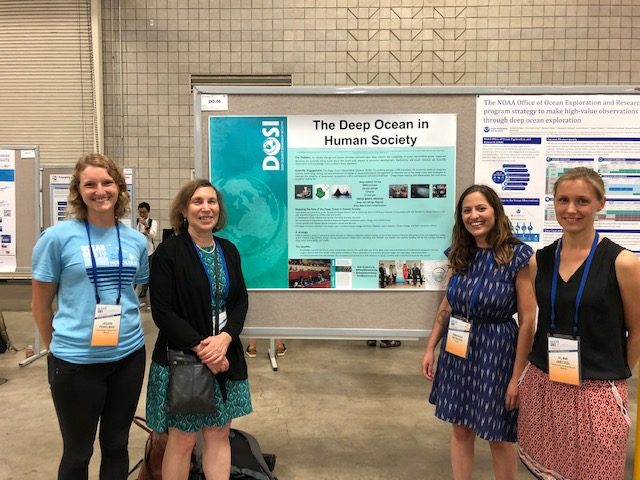DOSI presents poster at OceanObs’19, Hawaii. September 2019

Title: The Deep Ocean in Human Society
Authors: Jessica Perelman, University of Hawaii, USA; Lisa Levin, Scripps Institution of Oceanography, USA; Ana Hilario, University of Aveiro, Portugal; Kerry Howell, University of Plymouth, UK; Maria Baker, University of Southampton, UK; Kristina Gjerde, IUCN, USA; Harriet Harden-Davies, University of Woolongong, Australia; Elva Escobar, UNAM, Mexico.
As climate change and human activities encroach upon deep waters, the complexity of ocean stewardship grows. Important decisions are currently being made about the ocean with respect to economic development, biodiversity and ocean resource use. Scientific observation and knowledge must underpin these decisions. The Deep Ocean Stewardship Initiative (DOSI) seeks to integrate science, technology, policy, law and economics to advise on ecosystem-based management of resource use in the deep ocean and strategies to maintain the integrity of deep-ocean ecosystems within and beyond national jurisdiction. Current DOSI focus areas, in which deep-sea science is brought to bear on policy, are deep-seabed mining, BBNJ process, climate change, fisheries, oil and gas, marine genetic resources, deep-sea tailings disposal, and deep debris and contamination. Each has implications for achieving SDG14 and can benefit from targeted, multidisciplinary ocean observing.
DOSI put forward, in conjunction with the Decade for Ocean Science, a 10-year scientific program to map the role of the deep ocean in human society. By the end of the Decade, we aim to be able to reliably map and model: 1) the distribution of key habitats and species (including diversity, biomass), 2) connectivity of populations, including dispersal/migration pathways, gene, energy, and nutrient flows, 3) how species and habitats deliver ecosystem goods and services, and 4) impact of human activities in the deep ocean, including mining, energy extraction, fisheries, waste disposal, climate change, and their cumulative effects. We anticipate this will be achieved by a series of research projects focused on different deep-sea systems (similar to the former Census of Marine Life programme), but adopting a single global modular experimental design. Strong international collaboration (including with INDEEP and DOOS) and capacity building will be the building blocks of deep ocean sustainability and health.

